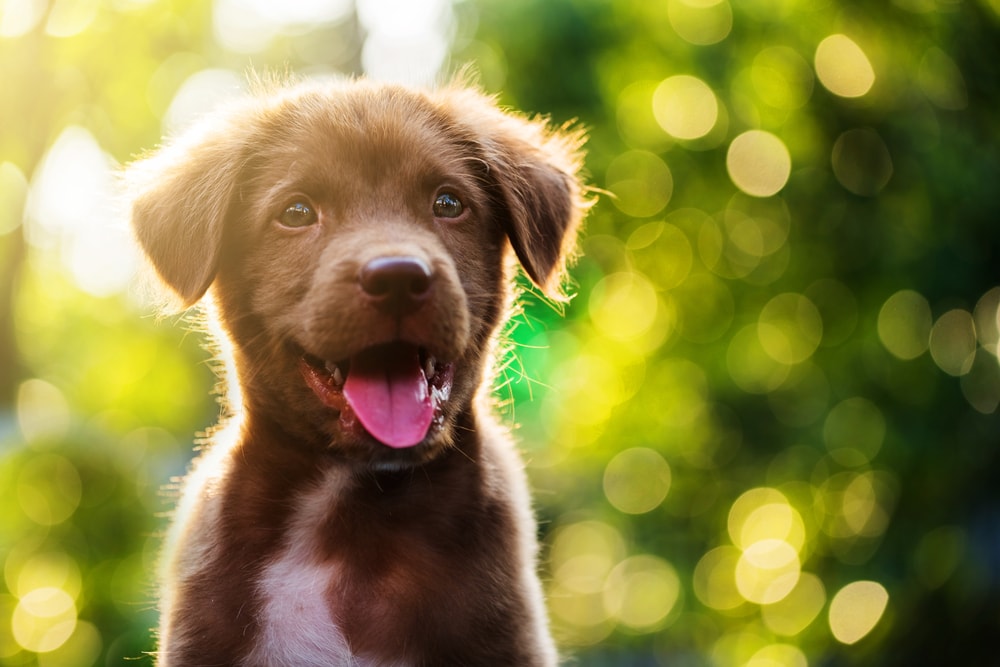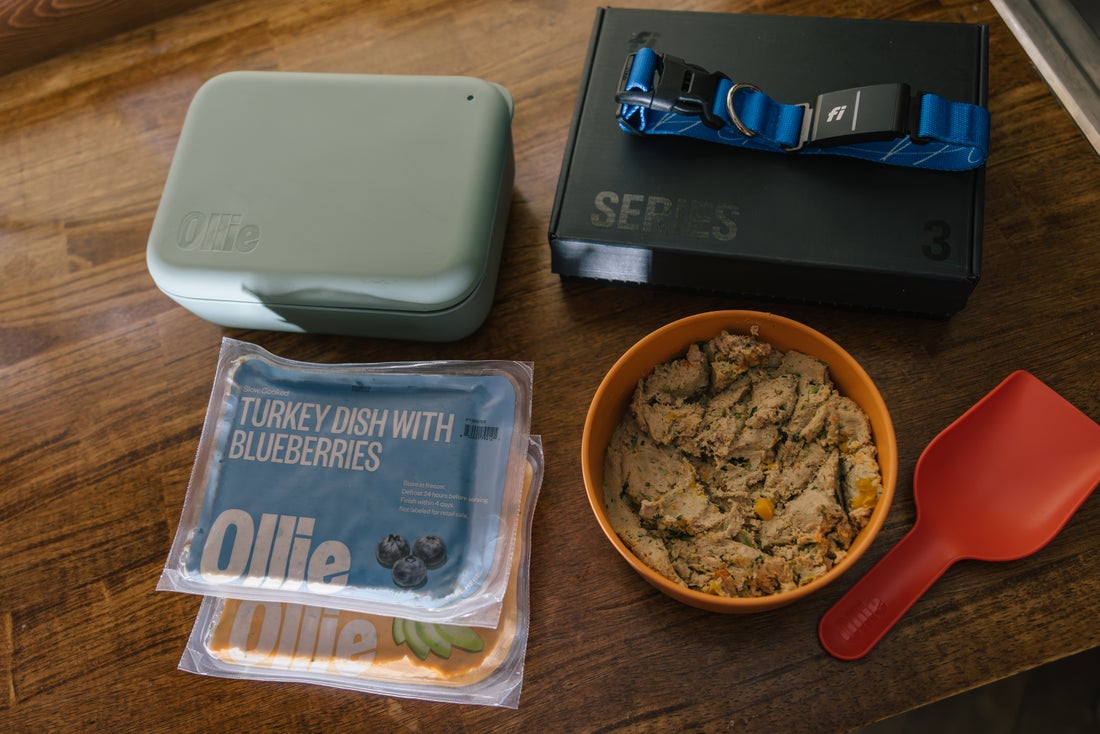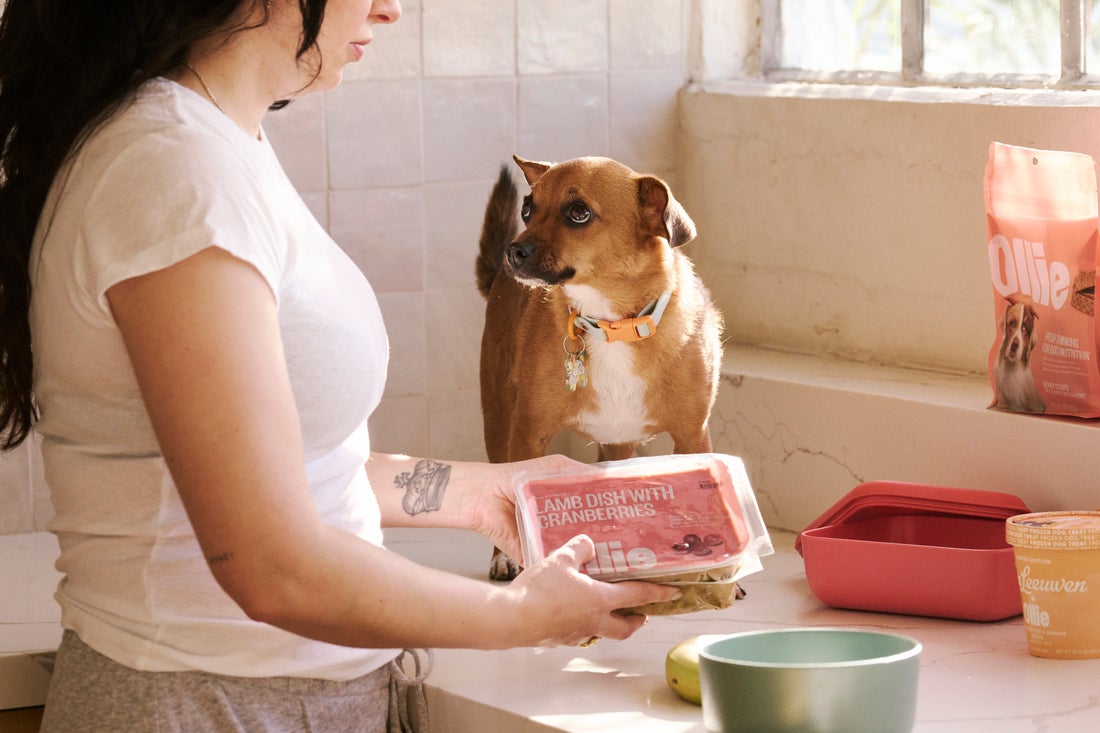Hey Ollie blog readers! We’re offering you an exclusive 60% OFF your starter box! Try now!
Dogs can get hiccups, and while it may seem odd, it’s usually harmless. Just like in humans, dog hiccups are caused by spasms in the diaphragm. These spasms can be triggered by eating or drinking too quickly, stress, or even too much excitement. While most hiccups go away on their own, it’s good to know when to let them pass, and when they might need a vet’s attention.
What are hiccups?
In both dogs and humans, hiccups are the spasm of the diaphragm, a muscle that sits just below our lungs. Hiccups happen when the diaphragm—the muscle under the lungs that helps with breathing—suddenly contracts. This quick contraction causes your dog to take in a sharp breath, and the glottis (the part of the throat that controls airflow to the lungs) snaps shut, making that classic hic sound. It’s a normal body reflex that can happen in both humans and dogs.
In dogs, hiccups usually show up as small, rhythmic jerks in the chest or belly. They might be followed by soft hiccup sounds or light twitches. Some dogs don’t make any noise at all, but you’ll still see the little spasms in their body. Puppies tend to get hiccups more often than adult dogs, and it’s usually nothing to worry about. Just like in people, hiccups often go away on their own within a few minutes.
In both dogs and humans, hiccups are the spasm of the diaphragm, a muscle that sits just below our lungs. The spasm results in the glottis (the space between the vocal cords) opening and closing quickly — what makes the signature sound of the hiccup.
Can Dogs Get Hiccups?
Yes, dogs can get hiccups—and they do! In fact, it’s pretty common, especially in puppies. Dogs experience hiccups for many of the same reasons humans do. Eating too quickly, drinking water in big gulps, feeling excited or stressed, or even just breathing in cold air too fast can trigger hiccups in your pup.
While dog hiccups might look strange or sound funny, they’re usually harmless. Most of the time, they only last a few minutes and don’t cause any pain or discomfort. If your dog gets hiccups every now and then, there’s no need to panic. It’s part of how their body works, and it’s not a sign of anything serious.
However, if your dog’s hiccups last longer than an hour, happen frequently, or come with other symptoms like coughing, vomiting, or difficulty breathing, it’s a good idea to check in with your vet. These could be signs of something more than just regular hiccups.In short—yes, dogs can get hiccups, and most of the time, it’s totally normal.
Why do dogs get the hiccups?
- Eating or drinking too fast The action of eating or drinking too fast can cause the diaphragm to spasm which results in —you guessed it —the hiccups. This is one of the most common reasons dogs, especially puppies, get the hiccups. If your dog consistently eats too fast you may wish to try a slow feeder. Slow feeders have shapes in the bottom that the dog’s food fills in and they have to eat around, thus slowing them down and making them “work” for their food a bit. If your pet is still eating to fast you can try feeding in a puzzle toy that dispenses only small amounts of food at a time.
- They have swallowed too much air This can go hand in hand with eating too quickly, but if your dog swallows too much air he or she might start to hiccup. Dogs who are playing vigorously and breathing heavily may also swallow too much air. If this happens, give your pet a break from playing and let them calm down a bit until the hiccups subside.
- They are excited or scared Stress can bring on the hiccups in both puppies and adult dogs. New or exciting situations can cause your dog to hiccup. Look at their body language to see if they are excited or scared. This information will help you to soothe or calm your pet. If your pet is scared, you may want to remove them from the situation or modify it to help them feel more comfortable.
Puppies are more prone to hiccups then adult dogs, this is because of their high energy levels. They may eat or drink more quickly and vigorous play can impact their breathing causing them to hiccup more often then adult dogs. You may also see your puppy hiccup upon waking from a nap. The internet goes crazy for puppy hiccup videos. You’ll find over 491,000 video results when you do a quick Google search!
How do you help your dog get rid of the hiccups?
Your dog’s hiccups should be short-lived, but some of the same “cures” that work for humans might also work for your pup as well:
- According to Dr. Stephanie Liff, You can try adding some sugar or honey to their water to help distract them so their diaphragm can relax.
- You could also try to massage your dog’s chest or gently startling him — just something gentle to help your pet relax. You don’t actually want your pet to be scared, but dropping something or a sharp clap to make them look around might just do the trick.
- Additionally, you can always wait for the hiccups to disappear on their own. Don’t give your dog anything large or solid to chew while they have the hiccups, this can lead to choking.
Are hiccups ever anything to worry about?
Generally speaking, hiccups are not serious or a cause for concern. However, if your dog is getting the hiccups frequently or the hiccups last several hours or are accompanied by wheezing, you want to make sure you consult your vet as it could be a symptom of something more serious.
Gastric issues or respiratory issues can present with hiccups so if you notice your pet’s hiccups are not going away or are accompanied by other symptoms including vomiting, diarrhea or trouble breathing you’ll want to contact your vet right away to figure out what is going on.
Can Puppies Get Hiccups?
Yes, puppies can get hiccups, and they actually get them more often than adult dogs. It’s completely normal and usually nothing to worry about.
Why so frequent? Puppies eat fast, play hard, and get excited easily. All of these things can lead to diaphragm spasms, which are the cause of hiccups. Their bodies are still growing, and their digestive and respiratory systems are a bit more sensitive during this early stage of life.
You might notice your puppy hiccupping:
- After eating or drinking quickly
- After intense play
- While sleeping or resting
As long as your puppy seems happy and isn’t showing signs of pain or distress, hiccups are harmless. They usually go away on their own in a few minutes.
When To Call Your Vet About Dog Hiccups
Most dog hiccups are short-lived and nothing to stress over—but there are times when a call to your vet is a good idea.
Here’s when to check in with your veterinarian:
Call your vet if:
- Hiccups last longer than an hour
- Your dog is vomiting, gagging, or coughing
- Your dog shows signs of pain, lethargy, or labored breathing
- The hiccups are frequent and daily
- Your dog stops eating or seems uncomfortable
Sometimes what looks like hiccups could actually be reverse sneezing, acid reflux, or a sign of respiratory or digestive trouble. It’s always better to play it safe—especially if the behavior is new or persistent.
Prevention of Dog Hiccups
While you can’t prevent every hiccup (especially in playful puppies), there are a few things you can do to reduce how often they happen.
Tips to help prevent dog hiccups:
- Slow down mealtime – Use a slow feeder bowl or puzzle toy to stop your dog from eating too fast.
- Keep water accessible – Let your dog drink small amounts throughout the day to stay hydrated without gulping.
- Avoid high-excitement meals – Don’t feed your dog right after intense play or exercise. Let them calm down first.
- Feed a high-quality diet – Some hiccups may be linked to sensitive stomachs or mild acid reflux. A balanced, fresh diet like Ollie can help support better digestion.
- Keep stress levels low – Anxiety can cause irregular breathing or swallowing, which may lead to more frequent hiccups.
In most cases, dog hiccups are just a passing quirk. But these simple steps can help your pup feel more comfortable, and may keep hiccup episodes to a minimum.
Frequently Asked Questions About Dog Hiccups
Do dogs get hiccups like humans?
Yes, dogs can get hiccups just like humans. It happens when their diaphragm spasms, usually after eating or drinking too fast, getting excited, or swallowing air.
Are dog hiccups normal?
Yes, hiccups are a normal body reflex in dogs, especially puppies. Most of the time, they are harmless and go away on their own within a few minutes.
How long do dog hiccups usually last?
Most dog hiccups last only a few minutes. If they go on for more than an hour or seem to happen often, it’s a good idea to talk to your vet.
Why do puppies get hiccups more than adult dogs?
Puppies breathe faster, have more energy, and are still developing their bodies. All of this makes them more likely to get hiccups, especially after eating, drinking, or playing.
Can hiccups be a sign of something serious in dogs?
Usually, hiccups are not serious. But if your dog also shows signs like coughing, vomiting, or trouble breathing, it could be a sign of something else. In those cases, it’s best to get your vet’s advice.
How can I help my dog stop hiccuping?
You can try calming your dog down, gently rubbing their belly, or offering a small amount of water. Slowing down how fast they eat can also help prevent future hiccups.
Should I worry if my dog gets hiccups every day?
Occasional hiccups are fine, but if your dog gets them daily or they last a long time, it might be worth asking your vet to rule out any underlying issues.
The Ollie blog is devoted to helping pet parents lead healthier lives with their pups. If you want to learn more about our fresh, human-grade food, check out MyOllie.com.
Tagged As:

The nutrition your dog needs,
the food they want.

Enjoying our articles? Subscribe our Newsletters and get new articles directly to your inbox
You might also like
18 September 2025
4 MINS READ
Is Fresh Dog Food Easier to Digest?
Yes, fresh dog food is generally easier for dogs to digest than highly processed kibble. Because it’s made with whole ingredients, gently cooked, and free from unnecessary fillers, fresh food supp…
by Ollie Pets
18 September 2025
5 MINS READ
Can I Rotate Fresh Dog Food Flavors?
Yes, it’s safe to rotate fresh dog food flavors, and many dogs actually benefit from the variety. At Ollie, we offer multiple fresh recipes, like Beef, Chicken, Turkey, Lamb, and Pork so you can…
by Ollie Pets
18 September 2025
5 MINS READ
Is Fresh Dog Food Safe During Power Outages?
Fresh dog food is only safe during a power outage if it has stayed cold, specifically, below 40°F. Once the temperature rises above that point, bacteria can start to grow, and the food may no lon…
by Ollie Pets







